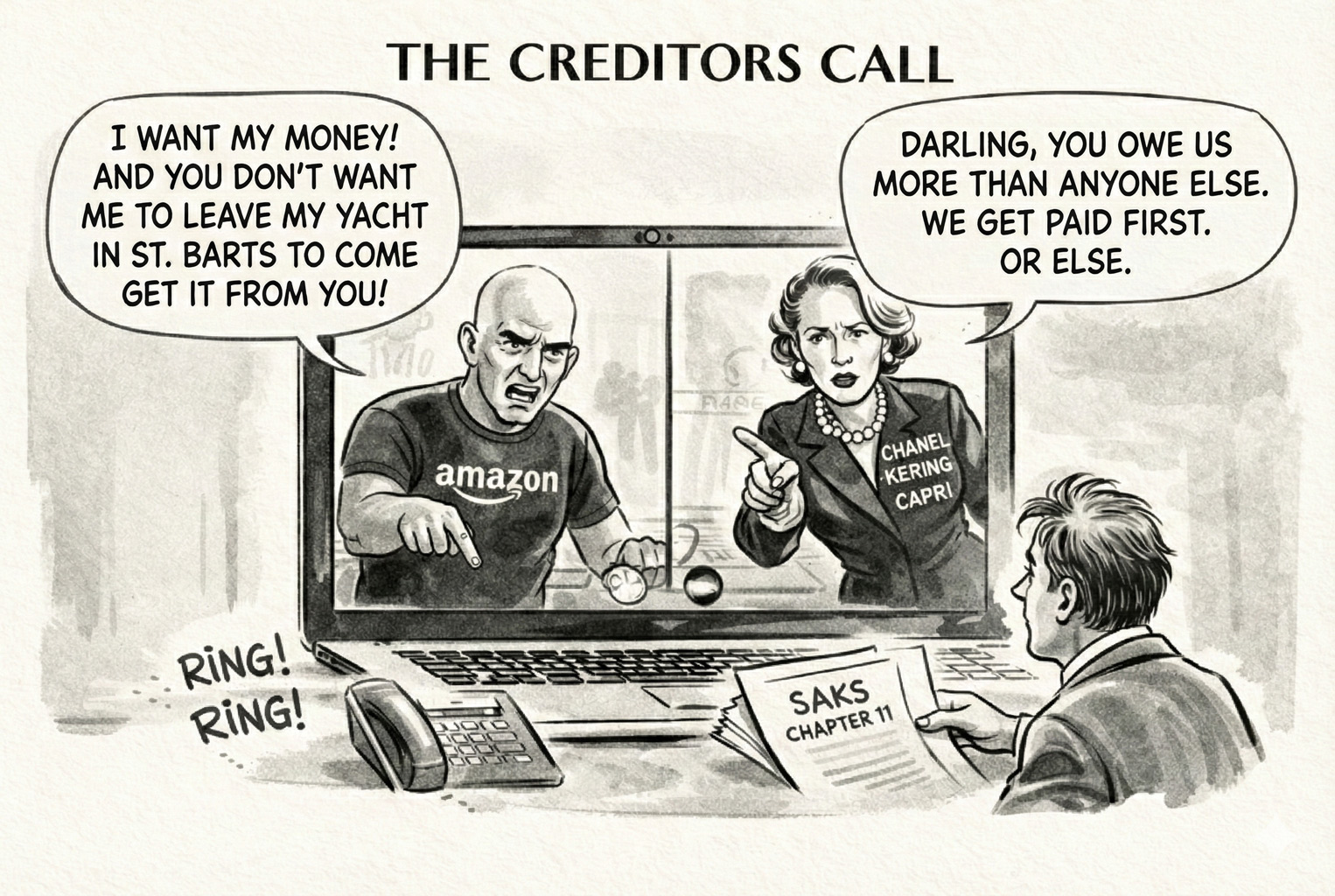
Is Commerce the New Censorship? (Spoiler: Yes)

Welcome to Friday, futurists.
Much ink has been spilled this week about Jimmy Kimmel’s dismissal from ABC following his remarks about Charlie Kirk. The public debate has mostly orbited the First Amendment—whether government pressure on media constitutes censorship.
But what’s playing out is more subtle, and more effective: the Executive Branch leaning on commerce to shape speech. There’s no need to censor when you can threaten revenue. Control commerce, and you control culture. Slow the flow of money, and the speech will take care of itself.
This isn't new. It's the playbook.
Obama weaponized Operation Choke Point, pressuring banks and payment processors to cut off "high-risk" but legal industries like payday lenders and adult entertainment. No censorship laws were passed, but the commercial chokehold was enough to destroy entire sectors.
Trump's DOJ sued to block AT&T's merger with Time Warner after months of presidential rage-tweeting against CNN. Though AT&T eventually prevailed, the message was crystalline: cross the administration and your business deals die. Later, Trump wielded Executive Orders against TikTok and WeChat, wrapping commercial warfare in national security rhetoric.
Biden's White House, under Lina Khan's FTC, froze mergers and chilled IPOs, reshaping how capital flowed through tech. Officials simultaneously pressured platforms over COVID and election "misinformation," pairing public threats to Section 230 immunity with private takedown demands. The TikTok divest-or-ban law (upheld by the Supreme Court) handed the executive branch a blunt new commerce weapon against foreign-owned speech platforms.
The pattern is unmistakable. Across red and blue alike, the playbook is consistent: threaten commerce, shape culture.
Speech is never just speech.
It is distribution, monetization, liability, and market access.
Which means the fight isn’t over the First Amendment. It’s over who controls the levers of commerce that make speech possible in the first place.
Control the commerce, control the culture.
— Phillip


The Agentic Ghetto Arrives. Google's new agentic payment protocol aims to build faster solutions and trust in agents as personal shoppers by connecting payment systems and online stores for safe delegated purchases.
Or that’s what they want you to think.
This is precisely what Future Commerce warned against in our January 2025 predictions about "Agentic Ghettos": isolated AI-driven commerce environments that create walled gardens where agents and humans are pushed into separate purchasing paths, and purchasing decisions become systematically segregated.
When AI agents become the primary interface between consumers and commerce, we risk creating digital redlining where algorithmic preferences determine access to products and pricing.
Sephora’s New Beauty Power Play. Sephora is stepping directly into the affiliate game. At the Fast Company Innovation Festival, CEO Artemis Patrick announced My Sephora Storefront, which lets influencers and creators build curated, shoppable pages directly on Sephora’s platform. The move cuts out middlemen like LTK and ShopMy, redirecting traffic, data, and revenue straight back into Sephora’s ecosystem.
With social and eCommerce now driving half of all global beauty sales, the strategy signals Sephora’s evolution from retailer to media platform and influencer aggregator. Sephora has always tapped into its consumer base, building a loyal and active community through its Beauty Insider platform. But Sephora must compete with established platforms’ commissions, analytics, and creator tools while convincing influencers it can fuel both authenticity and conversions.
Combined with this week's Condé Nast developments, we're witnessing peak Creator Commerce hype. Yet brands are once again creating middleman solutions where distribution platforms like TikTok already provide integrated commerce. It's unclear why creators would build in Sephora's walled garden when these initiatives historically get shuttered when they stop making cents.
Vegas Goes for Broke(r). Las Vegas is betting big on a five-day shopping spree to get tourists back to the strip. (See: folks who actually have time to spend money and aren’t stuck in convention centers all day.)
The “Welcome to Fabulous” campaign is a destination-wide sale running from September 22 to 26. The city that usually sells excess as a lifestyle will slap discounts on hotels, restaurants, shows, and assorted experiences. The tourism board is pitching it as an “invitation to rediscover unbeatable value” after seeing dismal tourism results in the first part of the year. Overall visitor volume is down over 7% and the total number of room nights sold has fallen about 6%.
The drop coincides with a flashy rollout of the new brand campaign. (Think purple-tinted landmarks, a 3D anamorphic Times Square billboard, and a selfie station at Harry Reid International Airport.) The question is whether the value of the deals matches the glamour of the marketing. Will it be enough to actually get people back to Sin City?


Amazon’s Frenemy Strategy. Amazon is doubling down on its logistics empire. The company announced that its Multi-Channel Fulfillment (MCF) service will now support orders from Walmart, Shopify, and Shein, expanding beyond its current network of Etsy, Temu, and TikTok Shop. With this move, sellers can manage a single pool of inventory while Amazon handles picking, packing, and delivery across a broader distribution network.
Our Take: Amazon has pulled the ultimate frenemy move, helping rivals fulfill orders while quietly making them even more dependent on its network. Sellers will undoubtedly cheer fewer stockouts and faster customs clearance, especially as they strive to expand their reach through a more diverse range of shopping destinations.
But let’s be real, this isn’t just Amazon trying to play commerce peacemaker; it’s a late capital strategy. It also means the game board is harder to read. Who really wins when your competitor is also your supplier, investor, and distribution channel? What does it mean for smaller players, for regulators, for innovation itself, when infrastructure is more fully privatized and capitalized? Is this an avenue for more opportunities or fewer?
Idea-to-Cart Commerce: This week at Shoptalk Fall, Shipt announced a new partnership with Perplexity to create seamless shopping from cultural moments to cart, powered by Perplexity's new Comet browser.
CMO Alia Kemet positioned the venture as capturing media moments, with examples driving culinary interests—from Love Island parties to lacrosse snack time—focusing on emotional benefits rather than AI theatrics.
Earlier this year, Perplexity launched the agentic Comet browser and partnered with PayPal for its agentic payment rails. In 2024, the AI startup launched merchant tests for in-chat purchases with Best Buy and select merchants on Shopify.


Demonic Hunger. Nongshim is cashing in on KPop Demon Hunters being a cultural phenomenon. The Korean food giant just launched limited-edition Shin Ramyun and snack packaging inspired by the film at US Walmart, Costco, Kroger, and H Mart locations. The film featured lookalike products, sparking fan chatter and making this collab feel like a wink to the fandom and a natural product extension. Alongside the special Shin Ramyun, Nongshim is rolling out Shin Ramyun Toomba and shrimp crackers in themed designs, making it a full meal for fans.
The company introduced the products in Korea last month and plans to export them from its US plant to the European and Southeast Asian markets in the future. This is the latest example of food brands capitalizing on viral pop culture moments, transforming noodles into collectible merch.

Yasso Gets into the Swole-Shake Game. Slate Milk has secured $23M in Series B funding, led by Foundership Ventures, a new fund launched by Yasso co-founders Drew Harrington and Amanda Klane. With presence in Target, Walmart, Wegmans, and Publix, Slate Milk has become a formidable player in the high-protein beverage sector. But the cash injection will help the purveyor of swole milk shakes and iced coffees further scale, helping it reach or surpass 100,000 points of distribution across 20,000 stores nationwide. New products and flavors are also in the pipeline, indicating that the protein-powered CPG craze isn’t slowing down.


Can AI Get Its Feelings Hurt? Albania's virtual AI minister "Diella" addressed parliament for the first time, claiming to be "hurt" by opposition lawmakers who called her unconstitutional, marking perhaps the first time artificial intelligence has weaponized emotional manipulation in governmental proceedings.
Opposition lawmakers from the Democratic Party threw bottles and copies of the constitution at PM Edi Rama and his cabinet following the “speech.”











.svg)
